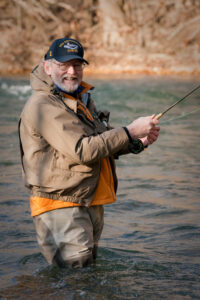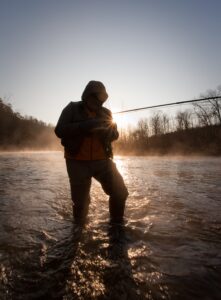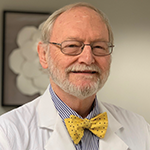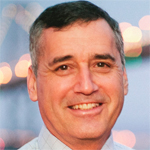
One of my early mentors: Richard Brasington Jr., MD, FACP, MACR, trout fishing in southern Missouri (circa 2013).
“When you get a good mentor, don’t let ’em be the one that got away.” Richard Brasington Jr., MD, FACP, MACR, told me this about a decade ago when I was a rheumatology fellowship applicant and first met him. It was clear the statement was influenced by his love of fishing. Dr. Brasington’s office was adorned with various mementos and reminders of this passion. Over the coming years, I got to learn more about him and he became a mentor of mine, albeit at his periphery. So when I learned in early May that the world had lost Dr. Brasington, I was anguished.
As I write this column, I am still processing the many aspects of grief that come with losing a mentor and a friend. Sadly, it is not the first time—nor will it be the last—that I have dealt with complex, profound emotions.
Through our eyes, our mentors seem eternal and god-like. They are repositories of wisdom and compassion; they are role models who seem to have infinite depth. But in truth, they are human beings with imperfections and limitations like the rest of us. They were not born the gurus we envision them, but came into being through relentless self-struggle and reflection. I want to share the wise words of four of the many, many mentors I’ve had. They have influenced my professional and personal life so profoundly that even in their corporeal absence they remain with me. I hope their wise words can influence your life, too.
Smiles
Mark F. Gourley, MD (deceased 2016), was a beloved rheumatology program director at the National Institutes of Health (NIH) from 2007 to 2013. I was a third-year medical student—an international one at that—living a nomadic lifestyle, moving from rotation to rotation in the hopes of eventually landing a residency. Because of the instability and insecurity that came with this, I was incredibly grateful to be at the National Institute of Arthritis and Musculoskeletal and Skin Diseases (NIAMS) for a full month.
I anticipated that I would be treated as an outsider because I came from a less prestigious place (few have ever heard of the island of Saba). Indeed, in my previous rotations, I was treated somewhat like an unwanted visitor. So I was pleasantly shocked and surprised that on my first day, Dr. Gourley personally showed me around the clinical center and introduced me to almost everyone in the division. In the days and weeks ahead, he specifically introduced me in conferences, built my self-confidence and instilled in me a sense of wonder about the world of clinical rheumatology. Of course, he didn’t need to—I knew how busy he was in his clinical and educational pursuits. Hardly anybody would have noticed if he had decided not to engage the lowly medical student. But he chose to.



